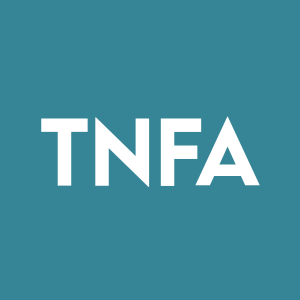TNF Pharmaceuticals Prepares to Advance Lead Clinical Program Targeting Age-Related Decline
MYMD-1® development to continue through fully funded mid-stage clinical trials
Clinical study of MYMD-1 in sarcopenia/frailty met primary endpoints for significantly reducing chronic inflammatory markers with statistical significance
MYMD-1 shown to inhibit excessive activity of TNF-alpha to regulate the immuno-metabolic system
Company holds FDA-cleared Phase 2 INDs for MYMD-1 in two additional chronic inflammatory conditions, rheumatoid arthritis and Hashimoto’s thyroiditis
“In our view, MYMD-1, if approved, could be the first orally administered TNF-alpha inhibitor drug and the first and only therapy for sarcopenia, a common age-related disorder that causes a prolonged decline in physical function. The success of our clinical strategy and regulatory pathway to date supports MYMD-1’s potential to disrupt the TNF-alpha inhibitor market,” said Mitchell Glass, M.D., President and Chief Medical Officer of TNF Pharmaceuticals. “As we prepare for our next fully funded clinical studies in sarcopenia/frailty, we also have open INDs for Phase 2 trials of MYMD-1 in two additional chronic inflammatory conditions, rheumatoid arthritis (RA) and Hashimoto’s thyroiditis, which we could pursue with the support of non-dilutive domestic and/or international development partnerships. A partner outside of the
“Each of MYMD-1’s indications provide solid measures of Company value,” Dr. Glass continued. “We are excited about the positive data we have gathered so far for our lead asset. Our next steps, to be revealed soon, will extend our reach toward significant and sustainable value creation, and long-term Company growth.”
MYMD-1 Phase 2 Clinical Development
MYMD-1 targets TNF-alpha (TNF-alpha tumor necrosis factor-alpha, or TNF-α), a protein in the body that plays a key role in inflammation and autoimmunity.
Sarcopenia. A small Phase 2 study, completed in 2023, investigated the efficacy, tolerability and pharmacokinetics of MYMD-1 in the treatment of participants with chronic inflammation associated with sarcopenia/frailty. The study met its primary endpoints for significantly reducing chronic inflammatory markers with statistically significant results.
- MYMD-1 significantly reduced serum levels of chronic inflammatory markers and met all primary pharmacokinetic and secondary safety and tolerability endpoints.
- MYMD-1 demonstrated statistical significance across three biomarkers: TNF-α (P=0.008), sTNFR1 (P=0.02), and IL-6 (P=0.03).
- No treatment-related adverse events (AEs) or serious adverse events (SAEs) occurred over the course of the study.
Sarcopenia, the aging-related progressive loss of muscle mass and strength in older people and in a growing population of younger people, is a condition which leads to greater risk of hospitalization, disability, and death. With no FDA-approved treatments for sarcopenia, the estimated
Rheumatoid arthritis (RA). An Investigational New Drug (IND) application for a Phase 2 study of MYMD-1 in RA was reviewed and approved by the FDA in August 2023.
MYMD-1’s small molecule design enables the drug to cross the blood brain barrier for entry into the central nervous system. In a preclinical trial, MYMD-1 was shown to significantly reduce swelling and other clinical arthritis measures compared to the widely used RA therapy Enbrel® (etanercept).2 Disease severity (total composite score) was reduced by
RA is a chronic, systemic inflammatory disorder that causes chronic inflammation of the joints and affects approximately 1.5 million Americans. RA’s cost to society, including healthcare costs; loss of employment; costs to employers, government, and caregivers; and costs associated with a deterioration of quality of life, is estimated to be over
Hashimoto’s thyroiditis. MYMD holds an FDA-cleared IND for a Phase 2 pilot study of MYMD-1 for Hashimoto’s thyroiditis, a condition in which the immune system stops recognizing the thyroid as part of the body and begins attacking it.
Hashimoto’s thyroiditis is the most common cause of hypothyroidism in
Secondary Drug Platform — Supera-CBD™
TNFA’s secondary drug platform, Supera-CBD™, is a synthetic, non-toxic cannabidiol (CBD) analog that is an 8000-times more potent CB2 agonist than plant-based CBD.7 Supera-CBD is targeted for the treatment of epilepsy, pain and anxiety/depression. Based on an in vitro binding analysis of Supera-CBD with three types of opioid receptors, the profile suggests that Supera-CBD could play a role in treating opioid addiction.
About TNF Pharmaceuticals, Inc.
TNF Pharmaceuticals, Inc. (Nasdaq: TNFA) (formerly known as MyMD Pharmaceuticals, Inc.), a clinical stage pharmaceutical company committed to extending healthy lifespan, is focused on developing two novel therapeutic platforms that treat the causes of disease rather than only addressing the symptoms. MYMD-1® is a drug platform based on a clinical stage small molecule that regulates the immune system to control TNF-α, which drives chronic inflammation, and other pro-inflammatory cell signaling cytokines. MYMD-1 is being developed to treat diseases and disorders marked by acute or chronic inflammation. The Company’s second drug platform, Supera-CBD, is being developed to treat chronic pain, addiction and epilepsy. Supera-CBD is a novel synthetic derivative of cannabidiol (CBD) and is being developed to address and improve upon the rapidly growing CBD market, which includes both FDA approved drugs and CBD products not currently regulated as drugs. For more information, visit www.tnfpharma.com.
Cautionary Statement Regarding Forward-Looking Statements
This press release may contain forward-looking statements. These forward-looking statements involve known and unknown risks, uncertainties and other factors which may cause actual results, performance or achievements to be materially different from any expected future results, performance, or achievements. Forward-looking statements speak only as of the date they are made and neither the Company nor its affiliates assume any duty to update forward-looking statements. Words such as “anticipate,” “believe,” “could,” “estimate,” “expect,” “may,” “plan,” “will,” “would’’ and other similar expressions are intended to identify these forward-looking statements. Important factors that could cause actual results to differ materially from those indicated by such forward-looking statements include, without limitation: the Company’s ability to maintain compliance with the Nasdaq Stock Market’s listing standards; the timing of, and the Company’s ability to, obtain and maintain regulatory approvals for clinical trials of the Company’s pharmaceutical candidates; the timing and results of the Company’s planned clinical trials for its pharmaceutical candidates; the amount of funds the Company requires for its pharmaceutical candidates; increased levels of competition; changes in political, economic or regulatory conditions generally and in the markets in which the Company operates; the Company’s ability to retain and attract senior management and other key employees; the Company’s ability to quickly and effectively respond to new technological developments; and the Company’s ability to protect its trade secrets or other proprietary rights, operate without infringing upon the proprietary rights of others and prevent others from infringing on the Company’s proprietary rights. A discussion of these and other factors with respect to the Company is set forth in the Company’s Annual Report on Form 10-K for the year ended December 31, 2023, filed by the Company on April 1, 2024, and subsequent reports that the Company files with the Securities and Exchange Commission. Forward-looking statements speak only as of the date they are made, and the Company disclaims any intention or obligation to revise any forward-looking statements, whether as a result of new information, future events or otherwise.
1 Journal of Frailty & Aging, Economic Impact of Hospitalizations in US Adults with Sarcopenia (2019)
2 ENBREL ETANERCEPT is a registered trademark of Immunex Corporation
3 https://reporter.nih.gov/project-details/10080141
4 Taylor N Peter et al. Global epidemiology of hyperthyroidism and hypothyroidism. Nature: Endocrinology. 2018 May; 14:301-316.
5 American Thyroid Association. General Information/Press Room. Available in: https://www.thyroid.org/media-main/press-room/
6 KUNSEL, Tenzin. Thyroid Gland Disorder Treatment Market. Allied Market Search, 2018. Available in: < https://www.alliedmarketresearch.com/thyroid-gland-disorder-treatment-market >
7 Company reports; study conducted by Eurofins Discovery, a Eurofins Scientific (EUFI.PA) company
View source version on businesswire.com: https://www.businesswire.com/news/home/20240821460281/en/
Investor Contact:
Robert Schatz
(646) 421-9523
rschatz@tnfpharma.com
www.tnfpharma.com
Source: TNF Pharmaceuticals, Inc.








